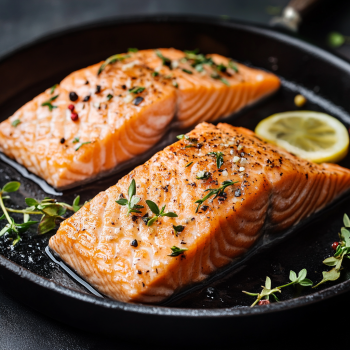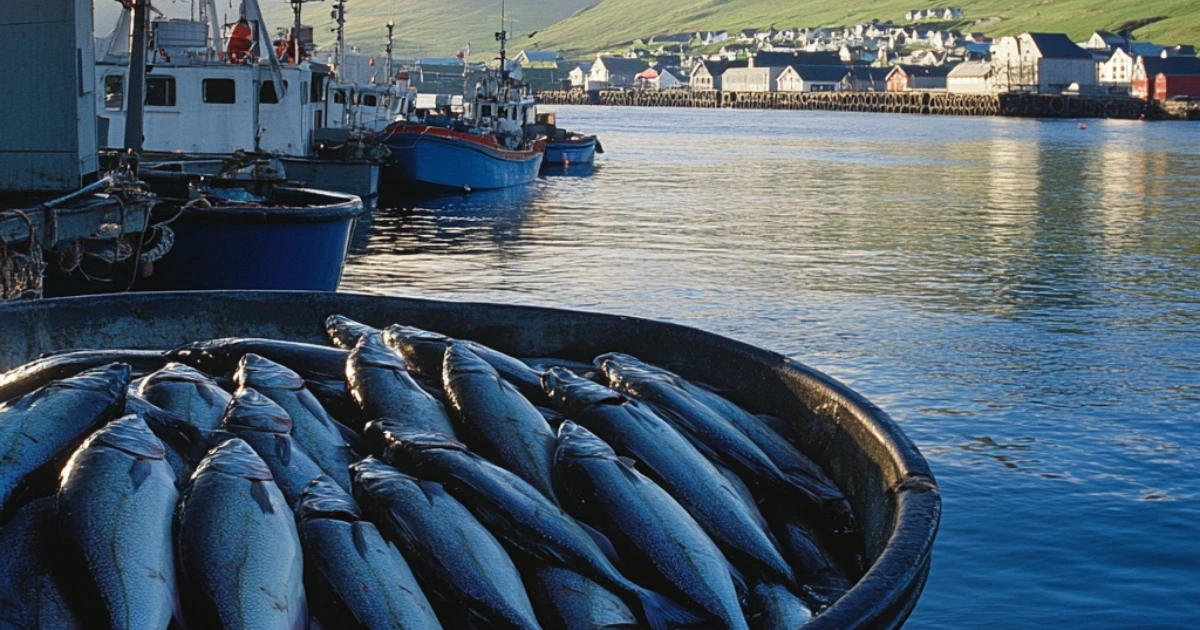Introduction
Salmon is a popular choice for those seeking a nutritious and delicious protein source. However, questions like Does Faroe Island salmon have mercury? often arise, particularly among health-conscious consumers. Understanding mercury levels in seafood and the practices behind farming Faroe Island salmon can help you make informed dietary choices.
This article explores the nutritional benefits of salmon, the concerns surrounding mercury in seafood, and why Faroe Island salmon stands out as a safe and sustainable option.
Table of Contents
Importance of Salmon in a Healthy Diet
Salmon is a nutritional powerhouse, offering numerous health benefits that make it a staple in many diets.
Key benefits of salmon:
- High omega-3 fatty acids: Supports heart and brain health.
- Rich in protein: Essential for muscle growth and repair.
- Packed with vitamins and minerals: Provides vitamin D, B12, selenium, and potassium.
Including salmon in your diet can help reduce inflammation, improve cholesterol levels, and boost overall health. However, understanding potential concerns like mercury levels is essential for maximizing its benefits safely.
Why Mercury in Seafood is a Concern
Mercury is a naturally occurring element found in the environment, but industrial activities have increased its presence in oceans, raising concerns about seafood safety.
Why mercury matters:
- Health risks: High mercury levels can affect the nervous system, particularly in young children and pregnant women.
- Bioaccumulation: Larger fish that live longer tend to have higher mercury levels due to accumulation over time.
- Consumer awareness: Understanding which seafood is low in mercury helps reduce exposure without sacrificing nutritional benefits.
This leads to the question, Does Faroe Island salmon have mercury? To answer that, we need to look at its habitat and farming practices.
What is Faroe Island Salmon?
Faroe Island salmon is a premium type of farmed Atlantic salmon, known for its exceptional flavor, texture, and quality.
Why it’s unique:
- Flavor: Mild and buttery, making it a favorite for gourmet dishes.
- Texture: Firm yet tender, ideal for various cooking methods.
- Sustainability: Produced with strict environmental standards.
This salmon is farmed in the pristine waters surrounding the Faroe Islands, a remote archipelago in the North Atlantic. Its quality and farming practices make it a preferred choice for health-conscious consumers.
Geographic Origin and Habitat
The Faroe Islands are located between Iceland and Norway, providing an ideal environment for salmon farming.
Geographic advantages:
- Pristine waters: Cold, clean ocean currents create optimal conditions for healthy salmon.
- Natural habitat replication: The strong currents mimic wild conditions, promoting active, robust fish.
- Minimal contamination: The remote location ensures low exposure to industrial pollution, reducing risks of mercury contamination.
This unique habitat plays a crucial role in answering Does Faroe Island salmon have mercury?
Farming Practices and Environmental Standards
Faroe Island salmon is farmed with a focus on sustainability and quality, setting it apart from many other farmed seafood options.
Key practices:
- Low-density pens: Reduces stress and disease among fish.
- Eco-friendly feed: Uses GMO-free, responsibly sourced ingredients.
- Regular monitoring: Ensures water quality and fish health.
- No antibiotics: A natural farming approach eliminates the need for antibiotics.
These practices help maintain the salmon’s pristine condition and contribute to its lower mercury levels compared to wild fish.
What is Mercury and Why is it Found in Seafood?
Mercury is a heavy metal that can be toxic in high amounts. It enters the ocean through natural processes and human activities, where it converts to methylmercury and accumulates in marine life.
Why mercury is in seafood:
- Bioaccumulation: Predatory fish, like tuna, accumulate mercury by consuming smaller fish.
- Environmental pollution: Industrial emissions increase mercury levels in oceans.
While mercury is a valid concern for many seafood options, farmed salmon like Faroe Island salmon tends to have lower levels due to controlled diets and environments.
For a comparison of different types of salmon, explore Is Faroe Island Salmon the Same as Atlantic Salmon?.
Mercury Levels in Different Types of Salmon
When comparing salmon, mercury levels can vary significantly depending on the species and how they are sourced.
Mercury levels by type:
- Wild-caught salmon: Typically low in mercury due to their shorter lifespan.
- Farmed salmon: Often has even lower mercury levels because of controlled diets.
- Larger species: Salmon like Chinook may have slightly higher levels due to their size and lifespan.
The question Does Faroe Island salmon have mercury? is best answered by examining its specific farming methods, which help minimize exposure to contaminants.
Faroe Island Salmon and Mercury
Faroe Island salmon is considered one of the safest seafood options when it comes to mercury levels.
Why it’s low in mercury:
- Controlled farming: Salmon are raised on a monitored diet, avoiding contamination from the wild food chain.
- Clean environment: The Faroe Islands’ remote location ensures minimal exposure to industrial pollution.
- Regular testing: Farmers frequently test for contaminants, including mercury, to ensure safety.
For consumers asking Does Faroe Island salmon have mercury?, the answer is reassuring: its levels are among the lowest, making it a safe choice for regular consumption.
Health Benefits of Faroe Island Salmon
Faroe Island salmon is not only delicious but also highly nutritious. Packed with essential nutrients, it provides significant health benefits that make it a standout choice. When considering Does Faroe Island salmon have mercury?, it’s reassuring to know that its controlled environment and farming practices help maintain low contaminant levels.

Key health benefits:
- Rich in omega-3 fatty acids: Supports heart, brain, and joint health.
- High protein content: Helps with muscle repair and overall energy.
- Vitamin-rich: Supplies vitamin D, B12, and selenium for immune function and bone health.
Consuming Faroe Island salmon as part of a balanced diet ensures you enjoy these benefits without worrying about high mercury levels, making it an excellent choice for regular consumption.
Role of Omega-3 Fatty Acids in Reducing Mercury Impact
Omega-3 fatty acids, abundant in Faroe Island salmon, not only promote health but also mitigate some effects of mercury exposure.
How omega-3s help:
- Brain protection: Omega-3s support cognitive function, reducing potential risks associated with mercury.
- Heart health: They improve cardiovascular health, counteracting mercury’s potential impact on the heart.
- Detoxification support: Omega-3s contribute to cellular health, aiding the body’s natural detox processes.
Does Faroe Island salmon have mercury? While trace amounts may be present, its high omega-3 content helps counteract these concerns, making it a smart seafood choice.
How to Safely Consume Salmon
Salmon is a fantastic addition to any diet, but knowing how to consume it safely is essential. When asking Does Faroe Island salmon have mercury?, it’s important to understand how preparation and portion control can enhance safety.
Tips for safe consumption:
- Limit intake: Stick to 2-3 servings of salmon per week to balance nutritional benefits and mercury concerns.
- Opt for high-quality sources: Faroe Island salmon’s controlled farming practices ensure lower mercury levels.
- Diversify your diet: Include other low-mercury seafood options to reduce overall exposure.
By following these guidelines, you can enjoy the health benefits of salmon without compromising safety.
Sustainability Practices and Mercury Reduction
Sustainability practices play a crucial role in reducing mercury levels in farmed fish. Does Faroe Island salmon have mercury? Thanks to its eco-conscious farming methods, mercury levels are kept to a minimum.
Sustainable farming practices in the Faroe Islands:
- Low-density pens: Reduces stress and ensures healthier fish.
- Eco-friendly feed: Minimizes contaminants in the fish’s diet.
- Clean water monitoring: Ensures minimal environmental pollutants enter the salmon’s habitat.
These practices not only protect the environment but also ensure that Faroe Island salmon remains a safe and nutritious seafood option.
Common Myths About Mercury in Salmon
There are many misconceptions surrounding mercury in salmon. To clarify Does Faroe Island salmon have mercury?, it’s essential to address these myths.
Common myths and facts:
- Myth: All salmon has dangerously high mercury levels.
- Fact: Farmed salmon like Faroe Island salmon has very low mercury levels due to controlled farming.
- Myth: Mercury in seafood makes it unsafe to eat.
- Fact: Most salmon, especially from trusted sources, is safe when consumed in moderation.
- Myth: Only wild-caught salmon is free from mercury.
- Fact: Farmed salmon, especially from sustainable farms, often has lower mercury levels than wild-caught options.
Understanding the truth behind these myths ensures you make informed seafood choices.
Faroe Island Salmon vs. Other Salmon in Mercury Content
When comparing different types of salmon, Faroe Island salmon stands out for its minimal mercury content.
How Faroe Island salmon compares:
- Wild-caught salmon: Often has slightly higher mercury levels due to bioaccumulation in the food chain.
- Farmed salmon from other regions: Quality and mercury levels vary, with some farms lacking strict regulations.
- Faroe Island salmon: Consistently low mercury levels due to sustainable practices and clean waters.
If you’re asking Does Faroe Island salmon have mercury?, the answer highlights its advantage over other salmon varieties, making it a reliable choice.
Why Faroe Island Salmon Stands Out
Faroe Island salmon is renowned for its exceptional quality, flavor, and safety. But does Faroe Island salmon have mercury? Its unique farming practices ensure that it remains one of the safest salmon options.

Why it’s exceptional:
- Pristine environment: Remote North Atlantic location minimizes contamination.
- Sustainability focus: Adherence to rigorous standards protects both fish and the environment.
- Regular testing: Ensures mercury and other contaminants are kept at safe levels.
These factors make Faroe Island salmon a standout choice for health-conscious consumers.
FAQs About Mercury in Faroe Island Salmon
1. Does Faroe Island salmon have mercury?
Yes, but in very low, safe levels due to sustainable farming and pristine water conditions.
2. Is Faroe Island salmon safer than wild-caught salmon?
In many cases, yes. Farmed salmon from the Faroe Islands is monitored to ensure low contaminant levels.
3. How often can I eat Faroe Island salmon?
You can safely enjoy 2-3 servings per week, thanks to its low mercury content.
4. Why is mercury found in seafood?
Mercury enters oceans through natural and industrial processes, accumulating in marine life.
5. What makes Faroe Island salmon low in mercury?
Its controlled diet, clean environment, and regular testing minimize mercury exposure.
6. Can pregnant women eat Faroe Island salmon?
Yes, in moderation. Its low mercury levels make it a safe and nutritious choice for expecting mothers.
Conclusion
In conclusion, Does Faroe Island salmon have mercury? While trace amounts are present, its levels are among the lowest compared to other seafood options. The Faroe Islands’ sustainable farming practices, pristine waters, and rigorous testing ensure this salmon is safe, nutritious, and environmentally responsible.
By choosing Faroe Island salmon, you’re not only supporting sustainable seafood but also enjoying one of the healthiest and safest options available. Whether for health benefits, culinary versatility, or environmental consciousness, Faroe Island salmon remains a top choice.

